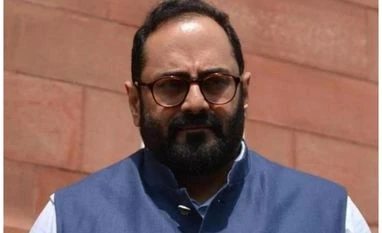'Simple' licensing norms in the works; MoS IT meets PC, laptop makers
PC sales during the upcoming festival season are expected to remain unhindered by the import restrictions
)
Minister of state for Electronics and IT Rajeev Chandrasekhar (Photo: IANS Twitter)
Listen to This Article
Minister of State for Electronics and Information Technology Rajeev Chandrasekhar on Tuesday met with top laptop, tablet and personal computer (PC) makers and assured them that the government would come up with an import licensing procedure that would be “simple and easy” to comply with.
The meeting sought to allay concerns of electronics majors over the proposed import restrictions on these products and their components.
“The government will make sure that there is no major paperwork. There will be a stipulated time within which the entire process (of getting the import licence) will be completed. However, only time will tell how it will eventually work out,” a person aware of the developments told Business Standard.
These companies have urged the government to prepare a draft licensing framework and consult the industry before finalising it, the person cited above said. More such meetings are expected to happen over the next few months.
Meanwhile, offline retailers and e-commerce platforms witnessed up to 20 per cent surge in laptop sales during the weekend, Business Standard has learnt.
Also Read
Tuesday’s meeting took place days after the Directorate General of Foreign Trade (DGFT) deferred the implementation of a mandatory licensing regime for import of these products, and announced a “transition period” till October 31.
In a surprise move, the DGFT had on August 3 put restrictions on import of laptops, tablets, PCs, and other similar data-processing units, citing “security risks” to citizens, and said that sourcing of such items would be allowed only from “trusted partners” through a licensing regime. The transition period was announced a day later, following criticism and concerns raised by the industry.
During the meeting, discussions also took place on the IT hardware production-linked incentives (PLI) 2.0 scheme, which is expected to help boost domestic manufacturing. As many as 44 electronics companies have already applied for incentives under the scheme and two applications – one from HP – have been approved.
“The extension has given a window of two-three months to discuss the licensing mandate and will allow the government to assess what the response is like for the PLI as well. If the government feels that most companies are on board for the PLI, it will most likely extend the deadline,” said another person aware of the discussions.
“Concerns were also raised about the process of obtaining a licence, what is the turnaround time, etc. There were also concerns about the import quota and whether there will be a cap on the quantity of devices that can be imported,” he added.
On the rise in laptop sales following the government’s decision, Nilesh Gupta, director, Vijay Sales, told Business Standard: “This weekend, we saw a 20 per cent uptick in laptop sales compared to the previous weekend.”
Retailers have recorded abnormally high sales amid an already increasing demand for PCs. “This is the back-to-college time, the period of highest laptop sales during the year. So, we usually see a spurt in laptop purchases,” Gupta said, adding, “This (increased sales) could, however, be an aberration as customers might have thought that imports will be restricted.”
Regardless, PC sales during the upcoming festival season are expected to remain unhindered by the import restrictions.
“We are expecting 15 per cent growth during the Diwali sales period compared to the previous year… We do not see any supply disruption as brands are expected to take proper corrective actions,” Gupta said.
Analysts at market research firm Counterpoint project PC shipments to go up by 9-10 per cent, fuelled by festive purchases and a pick-up in enterprise demand. “Festival season month normally accounts for 20 per cent of the sales for consumer electronics and is a very crucial period for OEMs,” said Tarun Pathak, research director, Counterpoint Research.
More From This Section
Don't miss the most important news and views of the day. Get them on our Telegram channel
First Published: Aug 08 2023 | 7:45 PM IST
